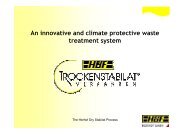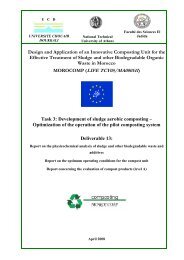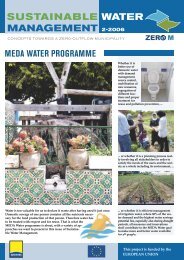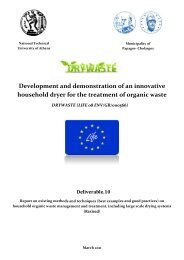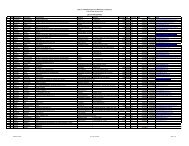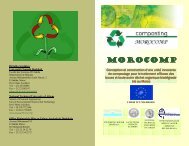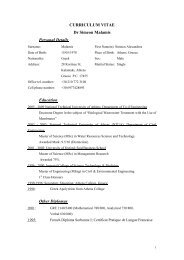morocomp (life tcy05/ma000141) - Unit of Environmental Science ...
morocomp (life tcy05/ma000141) - Unit of Environmental Science ...
morocomp (life tcy05/ma000141) - Unit of Environmental Science ...
- No tags were found...
Create successful ePaper yourself
Turn your PDF publications into a flip-book with our unique Google optimized e-Paper software.
III – Sludge availability and other BOW in MoroccoIf the actual assembled sludge production is <strong>of</strong> the order <strong>of</strong> 13,770 tonnes/year, forecasts arefor a 123,300 tonnes/year production by 2010 (or a nine-fold increase). It is therefore veryimportant, for Morocco, to establish a management and exploitation system for that source <strong>of</strong>organic matter, the inappropriate management <strong>of</strong> which can inevitably lead to environmentaland major public health problems.Apart from the individual tests conducted in Ouarzazate and in Ben Sergao where sludge isproduced from treated domestic wastewaters, no conclusive experimentation as regards to theexploitation <strong>of</strong> the residual sludge in Morocco was reported. Sludge is essentially dried anddeposited in the proximity <strong>of</strong> treatment plants or in public discharges or in certain casedispersed on the soil without previous treatment.As far as BOW are concerned, the most important sources are agricultural residues thepotential production <strong>of</strong> which varies between 67 million and 88.8 million tonnes per year.Nevertheless, the BOW quantity generated by other economic activities is estimated to 1.5million tonnes per year. The main agricultural residues are manure (73%) and straws fromcereals (21%). These two residues are easily assembled if their integration in the compostingline allows them to be more competitively pr<strong>of</strong>itable.IV – Management and legislative framework related to waste inMoroccoThe responsibility <strong>of</strong> the sector for wastes is still badly defined and remains divided, withoutcoherence between the various ministries (Minister <strong>of</strong> Interior, Minister <strong>of</strong> Health, Minister <strong>of</strong>Agriculture and Rural Development, Minister <strong>of</strong> Equipment, Minister <strong>of</strong> Industry, <strong>of</strong>Commerce, <strong>of</strong> Energy and Mines and the Department <strong>of</strong> the Environment).Regulations allowing solid waste management in Morocco are the main handicap <strong>of</strong> thissector. Indeed, the judicial context is relatively less favourable because <strong>of</strong> non-adaptation <strong>of</strong>certain ancient judicial texts, because <strong>of</strong> the delay in adopting new texts as the bill withregards to waste management and their elimination (Bill 28-00 relating to wastes, approvedby the Kingdom’s Parliament on 5/07/2006). This bill focuses, as a principal objective, on theprevention <strong>of</strong> pollution, the protection <strong>of</strong> human health and <strong>of</strong> the environment against theharmful effects <strong>of</strong> waste, inciting the reduction <strong>of</strong> their production, the control <strong>of</strong> discharges,the organization <strong>of</strong> transport and information to the public. This bill sets the rules and thefundamental principles which, from now on, constitute the reference point for wastemanagement and their elimination. It allows us to base a rational, modern and effectivexii




